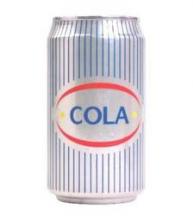Drinking cola significantly improved bioavailability of the orally administered tyrosine kinase inhibitor (TKI) erlotinib in patients with lung cancer who were concomitantly taking the acid-reducing agent esomeprazole, investigators reported online in the Journal of Clinical Oncology.
Mean exposure of erlotinib was significantly higher after drinking cola, compared with water in patients treated concomitantly with esomeprazole (area under the plasma concentration curve, AUC0-12h was 39% higher; range, –12% to +136%; P = .004 and Cmax was 42% higher; range, –4% to +199%; P = .019), probably due to increased solubility and absorption. In patients treated with erlotinib only (without esomeprazole), exposure was moderately increased with cola intake (AUC0-12h was 9% higher; range, –10% to +30%; P = .03 and Cmax was comparable; range, –19% to +18%; P = .75).
Use of proton pump inhibitors (PPIs) is often indicated during erlotinib therapy for patients with gastroesophageal reflux disease, or for patients treated with corticosteroids and nonsteroidal anti-inflammatory drugs.
“When erlotinib and a PPI are given concomitantly, the AUC of erlotinib steeply decreases, which suggests that lower bioavailability due to PPI use (up to 46% for erlotinib) may deprive patients from optimal therapy. Thus, in the case that the combination of a PPI and erlotinib is inevitable, the pH-lowering effects of cola may help physicians to optimize erlotinib therapy,” wrote Dr. Roelof van Leeuwen of Erasmus MC Cancer Institute, Rotterdam, the Netherlands (J Clin Oncol. 2016 Feb 7. doi: 10.1200/JCO.205.65.1158).
The researchers noted that Coca-Cola Classic has a substantially lower pH (about 2.5) than other acidic drinks, such as orange juice (pH about 4), 7-Up (pH about 3.5), and diet colas (pH about 3-4), making it well suited for use with erlotinib, since drinks with higher pH may not enhance absorption as well. Patients had 250 mL of cola, a volume that was well tolerated.
Previous studies have shown that erlotinib has significant intrasubject and intersubject variability, and intragastric pH is an important determinant. The drug’s pKa, at 5.4, is near the stomach pH range of 1 to 4, and intragastric pH changes lead to shifts toward the nonionized (less soluble) form and subsequent lower bioavailability than TKIs with higher pKa values.
The results with erlotinib might extrapolate to other TKIs with pH-dependent solubility, such as dasatinib, gefitinib, nilotinib, the authors suggested, which should be tested in future studies.


